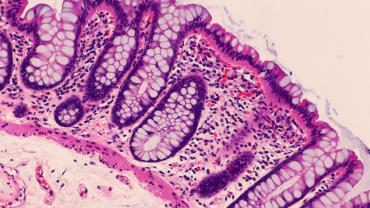
The gastrointestinal (GI) tract is an interface between the body and the environment. The layer of cells that line the GI tract has many ways to regulate the movement of molecules and microbes between the intestine and the bloodstream. When these regulation methods become abnormal, increased intestinal permeability may occur.
Increased intestinal permeability, often referred to as “leaky gut,” is characterized by the diffusion of certain toxins from the GI tract to the bloodstream. It is often associated with an inflammatory response. Some studies have proposed that increased intestinal permeability may be related to certain factors, including age, and it may be a potential contributor to the risk associated with certain chronic intestinal disorders.
A recently published article of a randomized controlled crossover study named the MaPLE trial, authored by Peron and colleagues, assessed the effects of implementing a polyphenol-rich diet on the gut microbiome and intestinal permeability. The study involved participants 60 years of age or older living in a residential care facility who were fed a polyphenol-rich diet for 8 weeks. Selected participants were those affected by increased intestinal permeability. Participants consumed three daily portions of selected polyphenol-rich foods, including green tea, certain forms of dark chocolate, and fruits, such as berries, blood oranges, and pomegranates for a mean daily total polyphenol intake of 1,391 mg.
Theobromine is a polyphenol found in cocoa that was correlated in the MaPLE trial with significant changes in certain gut microbiota, including taxa associated with the production of short-chain fatty acids (SCFAs). The SCFAs play many roles in the human body and are used as fuel for both beneficial microbes and intestinal cells. SCFAs may influence intestinal cell health, cellular metabolism and signaling, and cardiovascular health.*
Other conclusions from the MaPLE trial include statistically significant negative correlations between theobromine and potentially pathogenic microbes, including Methanobrevibacter, Desulfovibrio, and Enterobacteriaceae. Study results also indicate that the polyphenol-rich diet in the trial significantly lowered serum zonulin levels in a baseline-dependent manner. Zonulin is a protein found in the GI tract that has been associated with increased intestinal permeability. Changes in zonulin levels during consumption of the polyphenol-rich diet were also associated in the study with age.
The authors of the trial note that changes in lifestyle factors, such as diet, may be feasible to support health in the presence of increased intestinal permeability and its associated downstream effects. Certain fruits and vegetables provide compounds, such as dietary fibers and polyphenols, which may be supportive to GI health and the body’s response to increased intestinal permeability.
By Colleen Ambrose, ND, MAT